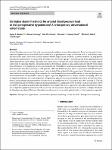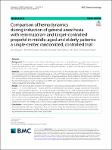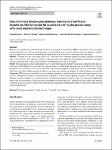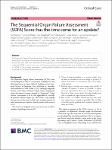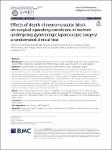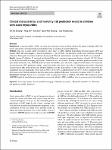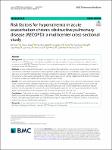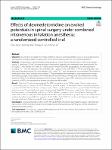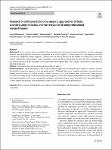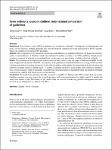Search
Author
- Daqing, Ma (3)
- Alexis, Ferré (2)
- Anna, Lybeck (2)
- Ashish K., Khanna (2)
- next >
Subject
- intensive care unit (8)
- acute respiratory dist... (5)
- chronic obstructive pu... (5)
- ICU (5)
- next >
Has File(s)
Search Results
Arterial blood pressure is one of the vital signs monitored mandatory in anaesthetised patients. Even short episodes of intraoperative hypotension are associated with increased risk for postoperative organ dysfunction such as acute kidney injury and myocardial injury. Since there is little evidence whether higher alarm thresholds in patient monitors can help prevent intraoperative hypotension, we analysed the blood pressure data before (group 1) and after (group 2) the implementation of altered hypotension alarm settings. |
Remimazolam confers a lower risk of hypotension than propofol. However, no studies have compared the efficacy of remimazolam and propofol administered using target-controlled infusion (TCI). This study aimed to investigate hemodynamic effects of remimazolam and target-controlled propofol in middle-aged and elderly patients during the induction of anesthesia. |
To assess radiological and functional outcomes of transilial internal fixator (TIFI) for treatment of sacral complete transforaminal fractures with a novel implantation technique that decrease wound irritation problems in addition to facilitating easy application of reduction methods beside showing the best entry points, screw trajectories and angles. |
The Sequential Organ Failure Assessment (SOFA) score was developed more than 25 years ago to provide a simple method of assessing and monitoring organ dysfunction in critically ill patients. Changes in clinical practice over the last few decades, with new interventions and a greater focus on non-invasive monitoring systems, mean it is time to update the SOFA score. As a first step in this process, we propose some possible new variables that could be included in a SOFA 2.0. By so doing, we hope to stimulate debate and discussion to move toward a new, properly validated score that will be fit for modern practice. |
In recent years, the relationship between the advantages and disadvantages of a deep neuromuscular block (DNMB), compared to a moderate block (MNMB) in laparoscopic surgery, has been increasingly studied. |
Acute myocarditis (AMC) can cause poor outcomes or even death in children. We aimed to identify AMC risk factors and create a mortality prediction model for AMC in children at hospital admission. |
Hyponatremia is an independent predictor of poor prognosis, including increased mortality and readmission, in COPD patients. Identifying modifiable etiologies of hyponatremia may help reduce adverse events in patients with AECOPD. Therefore, the aim of this study was to explore the risk factors and underlying etiologies of hyponatremia in AECOPD patients. |
We aimed to investigate the effects of different doses of dexmedetomidine (Dex) on evoked potentials in adult patients undergoing spinal surgery under intravenous anesthesia with low-concentration desflurane. |
An increasing clinical workload and growing financial, administrative and legal burdens as well as changing demands regarding work-life balance have resulted in an increased emphasis on clinical practice at the expense of research activities by orthopaedic trauma surgeons. This has led to an overall decrease in the number of scientifically active clinicians in orthopaedic trauma surgery, which represents a serious burden on research in this field. In order to guarantee that the clinical relevance of this discipline is also mirrored in the scientific field, new concepts are needed to keep clinicians involved in research. |
Fever without a source (FWS) in children poses a diagnostic challenge. To distinguish a self-limiting infection from a serious infection, multiple guidelines have been developed to aid physicians in the management of FWS. Currently, there is no comparison of existing FWS guidelines. |

